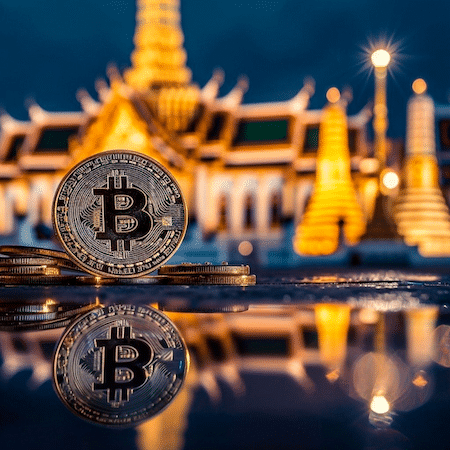







































Thailand’s Robust Regulatory Framework for Cryptocurrency: A Model for Global Governance
 CCY
CCY
 SEC
SEC
 SMOG
SMOG
 SECURITY
SECURITY
 CEO
CEO

In a recent interview, Oliver Linch, CEO of Bittrex Global, shared his insights on Thailand’s approach to regulating the cryptocurrency sector. Thailand’s Securities and Exchange Commission (SEC) has taken significant steps to tighten its regulatory framework in response to concerns about fraud and money laundering in the cryptocurrency space.
Thailand’s Regulatory Steps Towards a Secure Cryptocurrency Market
The SEC has issued warnings to both people and investors about the risks of using unauthorized digital asset operators, emphasizing that these operators do not offer legal protection. This regulatory body has recently banned access to unlicensed crypto exchanges and introduced pivotal changes aimed at strengthening the digital asset market. These amendments include removing investment caps for retail investors in asset-backed tokens and enforcing stringent custodial requirements. These requirements ensure that wallet providers are subsidiaries of publicly listed companies with secure asset management practices.
In addition, Thailand has prohibited Bitcoin ETFs, indicating a cautious stance towards high-risk financial products. This has led some to believe that Thailand has an anti-crypto stance. However, Oliver Linch sees these regulatory measures as crucial steps towards establishing a more secure and structured market, ultimately benefiting both investors and the broader cryptocurrency ecosystem.
Thailand’s SEC has also given the green light for institutional investors and ultra-high net worth individuals (UHNWIs) to purchase Crypto ETFs. This move aligns Thailand with wider APAC regulatory developments concerning digital assets and reflects the country’s evolving status as a regional crypto hub. Thailand is increasingly embracing blockchain and DeFi initiatives and hosting major industry conferences such as Money20/20 Asia.
The recent enforcement actions against unlicensed crypto platforms are designed to enhance investor confidence and market stability by ensuring a regulated environment for cryptocurrency trading. This reflects Thailand’s efforts to integrate its financial services with developments in the wider APAC and global financial ecosystem. There is a narrative in some circles that all enforcement action is “anti-crypto,” but Linch argues that if a country has a proper regulatory framework and a viable licensing mechanism, robust enforcement is appropriate and necessary. Such enforcement provides regulatory clarity and certainty, which can attract inflows and market participants.
Thailand’s Regulatory Alignment with Asian Counterparts and Its Implications
Thailand’s regulatory approach appears to be taking cues from other Asian markets, such as India and the Philippines, indicating a regional effort to establish consistent guidelines for the cryptocurrency industry. This alignment could contribute to the development of global governance standards. Positive developments, such as Hong Kong’s recently approved crypto ETFs, are influencing the region and are likely to spur similar advancements in the wider APAC market. Countries like Thailand could benefit from a growing APAC crypto market, with positive signals also coming from Singapore and Korea.
Thailand’s regulatory strategy increasingly mirrors that of South Korea. Both countries have decided against allowing spot Bitcoin exchange-traded funds (ETFs) in their domestic markets, focusing instead on investor protection and regulatory clarity. With high rates of crypto retail adoption, regulators in both Thailand and South Korea are keen on strengthening consumer safeguards and mitigating risks associated with unauthorized trading platforms.
In conclusion, regulators should address the issue of unauthorized cryptocurrency platforms by focusing on proactive measures. This includes leveraging enforcement actions, fostering industry collaboration, and promoting investor education to ensure compliance without stifling innovation.
In an interview with https://t.co/qA1mE8sOUy Oliver Linch, CEO of Bittrex Global, discussed Thailand's regulatory direction regarding the cryptocurrency sectorhttps://t.co/J90Ly9U68F
— crypto.news (@itscrypto_news) May 21, 2024
Smog: Solana-Based Meme Coin with High Growth Potential
Smog presents a distinctive approach compared to other cryptocurrencies, though it isn’t a traditional presale. This token has been included in notable lists due to its early-moving opportunities, similar to the leading crypto presales of 2024.
The unique airdrop strategy of Smog sets it apart. Rather than distributing airdrops as standard giveaways to long-term holders, Smog introduces gamification into the process. Investors are required to complete various tasks or quests to accumulate airdrop points. Those who gather the most points receive a larger share of the airdrop.
Adding to its appeal, Smog features dragon-themed aesthetics, bringing a fantastical element to the Solana blockchain. The narrative portrays Smog as a project poised to make a significant impact on the crypto market, reinvigorating meme coins as valuable investment assets.
The price of Smog soared immediately after its launch. Within three hours of becoming available on Jupiter DEX, its value increased by 1500%. In just a few days of trading on the decentralized exchange, the price surged by 4500%, indicating substantial interest within the crypto community. Those interested in benefiting from future airdrops may want to consider investing in Smog now.
Smog’s ecosystem also includes additional utilities like staking. Developers have enabled an ETH bridge, allowing users to purchase Smog with ETH. The token is also available for direct purchase from the official website.
Recent data from CoinMarketCap highlights Smog’s performance as a top-gaining meme coin. The token has surpassed popular coins such as Pepe and Dogecoin in weekly gains, demonstrating the growing interest in Solana-based meme coins.

Related News

